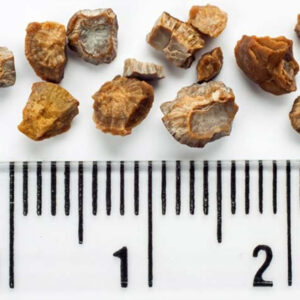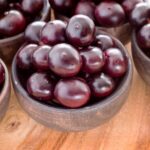Ode to a Kidney Stone

Kidney stones of various sizes above a Metric CM ruler.
How and why can a 45 -year old man, in top physical condition…a renowned doctor of nutrition and marathon runner, fall victim to an excruciating kidney stone? Well, as my ode to a kidney stone will lay out, I am sure that I know how it happened – how a tiny 2-millimeter kidney stone kept me on my back for days!
It was just a few weeks after I completed running the New York City Marathon (time: 3 hrs, 48 minutes) when I was accompanying my daughter to her place of work in Mount Kisco. I sat down in the car and within just a few minutes I had a strong urgency to urinate – unlike any urge I had every experienced. I asked my daughter to “step on it” and her reply was, “sorry dad, I can’t speed”, so I quietly bit my lip. After 3-4 minutes we finally arrived at her place of work; I took the drivers seat and sped to my office just a block away.
I rushed in to urinate, but to my surprise, I could not.
Nothing was coming out! I immediately knew something was really wrong. I knew that I had some sort of blockage preventing the free flow of urine. I quickly ran down the list of possible causes in my mind including:
- enlarged prostate;
- kidney stone (I had had another 5 years earlier);
- kidney infarction, urinary track infection, and a few others)
I slowly made my way home and started to develop severe left-sided pain over my abdomen. As the hours progressed, later into the evening and the next day, I was feeling very sore in my back over my kidneys and was sure that my kidney stone had recurred.
Hence, my ode to a kidney stone!
I have treated many patients with kidney stones, as well as people who knew that they were predisposed and wanted to reduce their risk of recurrence.
I have always been aware to keep my water intake very high and had done, so I thought, an adequate job, but I did not. My type of stone was a calcium oxalate stone; a type of stone most commonly caused by dehydration. I had trained eight months straight for the New York Marathon and was always conscious to drink lots and lots of water – I even ran with a camel-back (a backpack filled with water that I would drink continuously through a straw).
In summary, here is what I did…
- Drinking water throughout the day;
- Running with a camel-back I had in fact trained the prior 750 miles of my marathon training runs with my trusty camel-back. In the end, however, it was clear that my calcium-kidney stones were not adequately prevented even with my knowledge and preventative strategies.
I have to conclude, in my circumstance if I am to train for unnatural events like marathons that I would be forever predisposed to my particular brand of kidney stones.
No magic herb can dissolve a kidney stone once it has formed; no amount of water or any other fluid will dissolve a kidney stone once it has formed.
So what is one to do to prevent and to deal with kidney stones once they have formed?
First, let’s start with a brief description of the different types of kidney stones
What is a kidney stone?
A kidney stone is a solid piece of material that forms in the kidney out of substances in the urine. Normally, urine contains chemicals that prevent or inhibit the crystals from forming. However, these inhibitors do not seem to work for everyone.
Kidney stones may contain various combinations of chemicals. The four most common types of kidney stones contain:
- Struvite
- Calcium
- Uric acid
- Cystine
-
Calcium (Oxalate or Phosphate) Kidney Stone
The most common kidney stone type contains calcium in combination with either oxalate or phosphate. These are called calcium oxalate stones or calcium phosphate kidney stones, respectively. Calcium is a normal part of a healthy diet and makes up important parts of the body, such as bones and muscles. Calcium that is not used by the bones and muscles goes to the kidneys. Interestingly, calcium supplements, if taken in excess, can contribute to this type of stone, but calcium found in milk and other food products does not seem to. In most people, the kidneys flush out the extra calcium in the urine. However, when calcium stays in the kidneys, it joins with other waste products to form a calcium kidney stone. They tend to form when the urine is acidic, meaning it has a low pH. An overly acidic diet (a diet high in processed and refined sugars and red meats, among other acidic potentiating foods, can cause too low of a pH).Many health problems can cause a low pH. Stress, medications and even excessive exercise can cause an unnaturally low pH.
Some of the oxalate in urine is produced by the body. Calcium and oxalate in the diet play a part but are not the only factors that affect the formation of calcium oxalate stones. Dietary oxalate is an organic molecule found in many vegetables, fruits, and nuts. Calcium from bone may also play a role in kidney stone formation. Calcium phosphate stones are less common. Calcium phosphate stones tend to form when the urine is alkaline, meaning it has a high pH. I have seen many patients who have excessively increased their urinary pH causing not only kidney stones, but also metastatic calcifications (cancer), arthritis and hardening of the arteries.
The most common cause of calcium kidney stones is dehydration; A CALCIUM KIDNEY STONE CANNOT PRECIPITATE (FORM) IF ONE IS WELL HYDRATED.
-
Struvite Kidney Stone
A struvite stone, also known as an infection stone, may form after there is an infection in the urinary system. This type of kidney stone contains the mineral magnesium and the waste product ammonia. Struvite stones result from infections in the kidney. A “generally healthy diet, or an antiinfectious diet, may help treat or prevent this type of kidney stone. Preventing struvite stones depends on staying infection free. Diet has not been shown to affect struvite stone formation however for the most part.
-
Uric Acid Kidney Stone
A uric acid stone may form when there is too much acid in the urine. An acid forming diet, certain medications, under hydration and various disease states causing the release of acidic compounds, can all contribute to uric acid stones. If you tend to form uric acid stones, you may need to cut back on the amount of meat that you eat. Uric acid stones are more likely to form when the urine is persistently acidic, which may result from a diet rich in animal proteins and purines-substances found naturally in all food but especially in organ meats, fish, cheese, wine and shellfish. The B-vitamin folic acid might be important for reducing the formation of uric acid stones.
-
Cystine Kidney Stone
Cystine is one of the building blocks that make up muscles, nerves, and other parts of the body. Although cystine stones are rare, they may form when there is too much cystine buildup in the urine. The disease that causes this kidney stone type runs in families. Cystine stones result from a rare genetic disorder that causes cystine-an amino acid, one of the building blocks of protein—to leak through the kidneys and into the urine to form crystals. This stone is most commonly genetically predisposed and may be helped with hyper-hydration.
Sometimes kidney stones are an isolated event, but often they are secondary or result from various metabolic problems diseases. Our approach to kidney stones is to begin with hydration; to carefully search for pH problems (blood pH is most important!), search for secondary diseases and nutritional imbalances.
 Next Post
Next Post